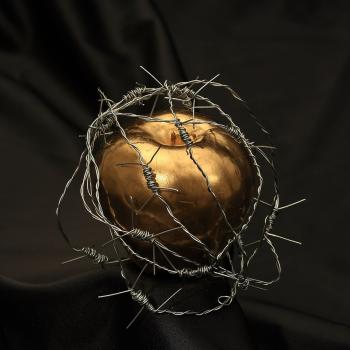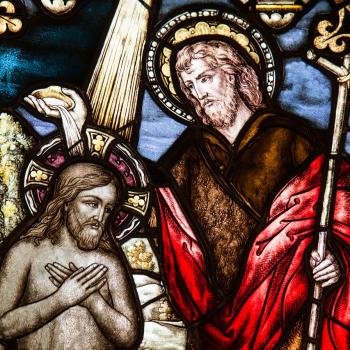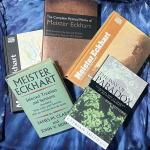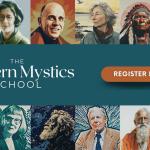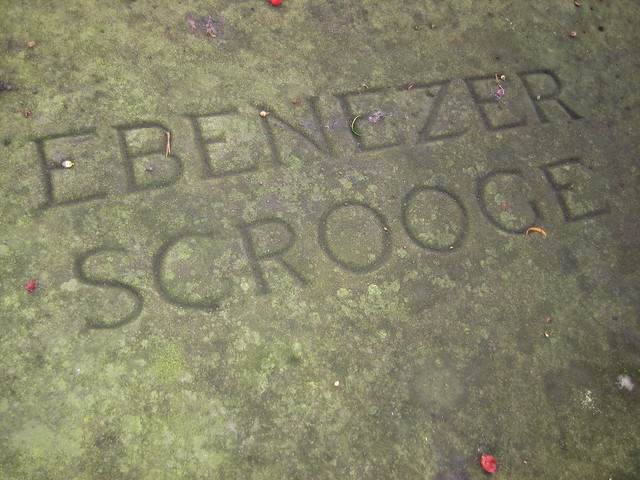
Following the Example of Ebenezer Scrooge
For some reason, Ebenezer Scrooge has been on my mind lately. It could be because we have been inundated with versions of A Christmas Carol this month. Whether in writing or on film, the story captures our attention and our emotions.
A movie called The Man Who Invented Christmas describes how Charles Dickens sparked Victorian holiday celebrations. Many of the practices in his story have become our familiar holiday traditions. We feel nostalgia for his ideas whether we have ever practiced them or not.
The most compelling character in a story full of fascinating people is Ebenezer Scrooge.
He may capture our attention simply because of his name. There are also the words so closely identified with him, “Bah! Humbug!”
We may like to think we identify with Bob and Emily Cratchit or Scrooge’s nephew Fred, or maybe Jacob Marley or Tiny Tim. It comforts us to believe we are more diplomatic than Scrooge and understand Christmas more deeply.
The fact is we are probably more like Ebenezer Scrooge than any other character in the story. Even today we are following Scrooge’s example.
What Ebenezer Scrooge Believes
Ebenezer Scrooge has found values in which he believes and which work for him.
He has fully committed his life to one idea. Scrooge trusts the power of financial security. He believes life is about making a profit and that is how he evaluates his life.
Scrooge distrusts other values because he is so focused on financial independence.
Ebenezer Scrooge also believes in telling the truth, being authentic, being honest. He tells people exactly what he thinks and exactly how he feels. Scrooge values financial security and has no trouble putting his values into words.
He has no patience with people who pretend to be nice when they are seeking a profit.
Scrooge has committed his life to financial independence. He is certain he deserves to decide where his money goes without interference from anyone.
Ebenezer Scrooge believes people receive what they have earned, as he has. He sees himself as someone who has worked hard and made sacrifices to get where he is in life.
If other people want to make a good living, as he does, they need to do what he has done.
Scrooge sees himself as independent even though his financial success depends on others. Victorian England is an empire with financial strength based on colonies and cheap labor around the world. The original story includes sailors, miners, and servants who make Scrooge’s success possible.
What Do We Believe?
One of Ebenezer Scrooge’s examples we still follow today is how we see ourselves in the world.
We believe life is practical. Life needs to make a profit, make a difference.
It can be frustrating when we think we see people trying to take advantage of our efforts. We like to think we are independent, responsible for ourselves.
It is a challenge for us to see the vast network of people whose work makes our lives possible.
Like Victorian England, our financial strength depends on inexpensive labor in distant countries. We are used to taking what we want and paying little for it.
It is as if we believe we have earned what we have and it is only fair for us to have it.
We expect life to treat us fairly. If other people want what we have they should do as we have done.
Our actions, like Scrooge’s, describe what we believe.
How Scrooge Changes
Ebenezer Scrooge also gives us another, distinct example. He is transformed overnight through the intervention of four spirits.
With the help of these spirits Scrooge looks at his life in a new way. Their guidance leads him to reflect on his own experience and what he sees around him. Scrooge takes time to contemplate his own actions and their results.
As the story unfolds, Scrooge gains insight into the way he experiences the world. He recognizes the consequences of his own behavior. As he reflects his understanding of the world begins to deepen.
Scrooge experiences a literal awakening on Christmas morning. What the spirits have shown him inspires him to change his actions. Scrooge takes tangible steps to restore and strengthen neglected relationships. His way of seeing the world and his ways of living in it are transformed.
Scrooge’s new ways of behaving have measurable effects in the world around him.
Can We Change?
Is it possible for us to follow Ebenezar Scrooge’s example of changing his behavior as well? In what ways can we take meaningful steps to restore and strengthen our relationships?
First, we need to follow Scrooge’s example of reflection and contemplation. Even without the direct help of Jacob Marley and the other spirits, we can take a fresh look at our experiences.
How can we see the past, the present, and our expectations of the future with new eyes? Are we willing to spend the time it takes to see things even if it does not happen overnight?
Second, as we wake up to new questions and insights are we willing to make changes? It will take us time and effort to put what we see in our reflection into practice. Are we able to be patient with ourselves as we get tired and discouraged? How will we respond when we make mistakes?
It is one thing to change our lives overnight, in a few pages. There is more of a challenge with real people.
It is also important for us to recognize even Scrooge did not change the entire system immediately. He chose to do what he could within his own circle of relationships.
Scrooge’s story and example have many lessons to teach us.
We have a great deal to learn from the example of Ebenezer Scrooge. Some lessons have already worked their way into the fabric of our culture and society. There are some very valuable lessons still waiting for us.
How are we following the example of Ebenezer Scrooge this week?
What can we do to follow his example today?
Greg Richardson is a spiritual director in Southern California. He is a recovering assistant district attorney and associate university professor and is a lay Oblate with New Camaldoli Hermitage near Big Sur, California. Greg’s website is http://StrategicMonk.com and his email address is StrategicMonk@gmail.com.




